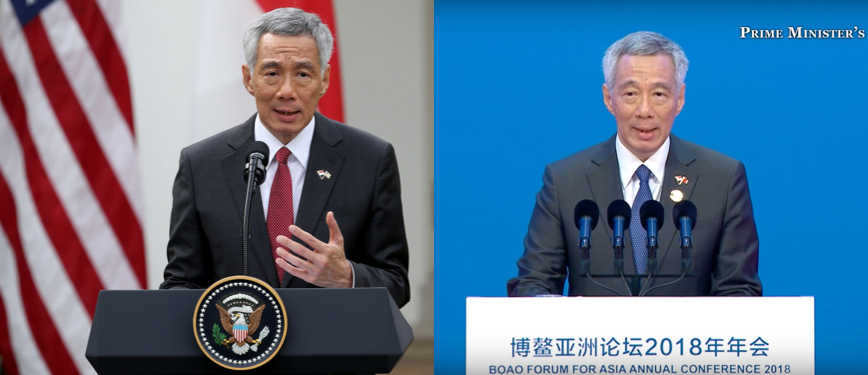See if you can spot the similarity in the following headlines.
The first is from Channel NewsAsia, published on April 10.
 Screen shot via CNA.
Screen shot via CNA.
This followed Prime Minister Lee Hsien Loong's opening speech given at the Bo’Ao Forum for Asia in Qionghai, Hainan on April 10.
The Forum is seen as China's answer to the Davos World Economic Forum.
Alright, now let's look at this op-ed piece published by the Washington Post on April 18.

 Screen shots via Washington Post.
Screen shots via Washington Post.
Yup you've got it.
Trade wars bad. Unilateral tariffs, sad.
In his op-ed, PM Lee makes the following four main points.
1. Americans are not happy
He acknowledges the obvious -- there is currently a wellspring of dissatisfaction in the US over trade with China.
"There is broad political support in the United States for such measures. American businesses that had previously advocated China’s accession to the World Trade Organization now feel disadvantaged doing business in China.
They feel, with some justification, that the playing field is uneven, market access is limited and investments are restricted, especially in the financial and technology sectors."
2. Why can't we be friends?
He points out that the US and China have more to gain from cooperating with each other than from direct competition.
"The United States and China share the most important bilateral relationship in the world. Both countries have benefited from an open, rules-based international order and multilateral trading system."
[related_story]
3. China is changing
PM Lee lists the ways in which China is already changing and liberalising its trade practices to be more in line with international norms, such as protecting intellectual property rights.
He also cites their investment in projects like the Belt and Road Initiative and the Asian Infrastructure Investment Bank as signs that China is willing to strengthen its ties to the global economy.
"These moves have been acknowledged and welcomed by President Trump. We look forward to seeing these steps elaborated, implemented and bearing fruit."
4. Other priorities
He also says that the US and China are going to have to cooperate on other issues than trade to solve long-running problems, like the situation in the Korean Peninsula, climate change, the proliferation of nuclear weapons, and security issues.
"None of these issues can be solved without the full participation of both countries."
Same message
This op-ed touches upon remarkably similar points to his speech at the Bo'Ao Forum.
There, PM Lee emphasized the importance of China in the global economy, but also the importance of it adhering to a rules-based international system, such as the World Trade Organisation.
The WTO was also mentioned in the Washington Post op-ed. US President Donald Trump has recently criticised the international trade organisation.
Under Trump, the US has backed out of other international trade deals like the Trans-Pacific Partnership and also slapped tariffs on certain imports from China.
Play by the rules
As a small country, Singapore's foreign policy has consistently been to support an international, rules-based order.
Our political leaders have maintained this approach consistently over the years, because our survival depends on it.
In his op-ed, PM Lee was candid about the damage a trade war could do to Singapore:
"We are a small, open economy with trade flows more than three times our GDP. A trade war between the two largest economies in the world will have a big, negative impact on Singapore."
It calls to mind the Malay proverb "When the elephants fight, the mousedeer gets crushed in the middle."
Let's hope the leaders of the two superpowers will consider the advice of PM Lee - a friend of both the United States and China - into consideration.
Top image adapted from McNamee via Getty Images and Prime Minister's Office, Singapore via YouTube.
If you like what you read, follow us on Facebook, Instagram, Twitter and Telegram to get the latest updates.
